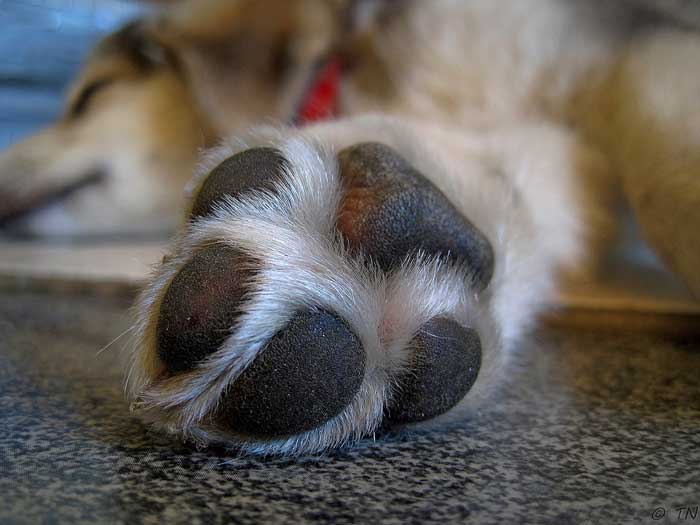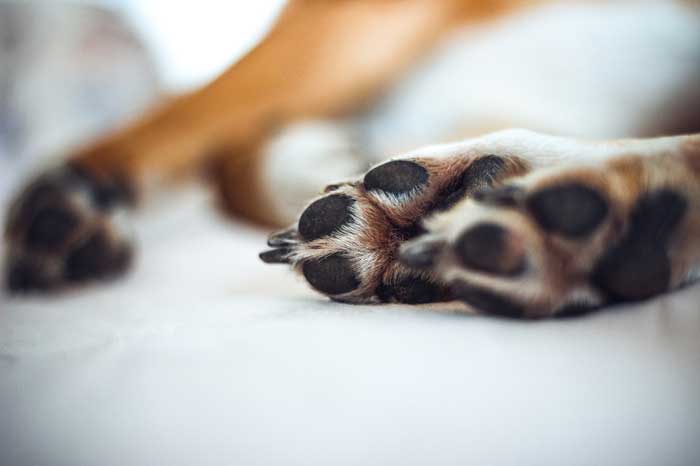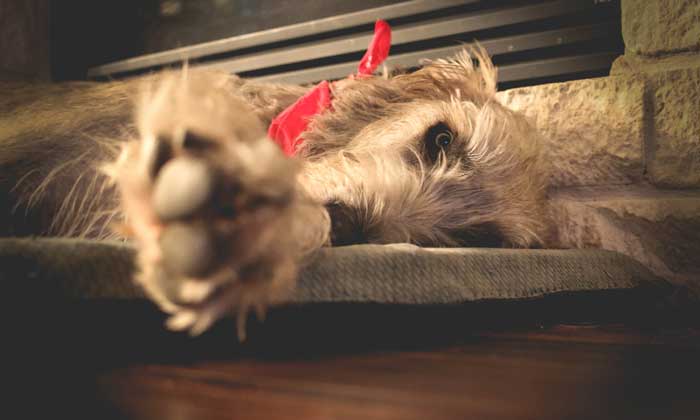It’s common that dogs occasionally lick, and even chew their paws. This can be a harmless and normal behavior.
Although we must be attentive since, in some cases, this behavior can become a problem that can even cause dogs to injure themselves severely.
For this reason, it’s essential to know the reasons why is a dog licking his paws and be able to recognize when it’s something to worry about.
In these cases, it is important to ask: how to stop my dog from licking his paws?
Why Do Dogs Lick Their Paws
There are several reasons why dogs lick their paws.
Although it’s common to see it in cats, some dogs also tend to groom themselves. It’s frequent for dogs to clean their paws either when preparing to take a nap, after walking or after eating.
But on some occasions, the habit of a dog licking his paws can be a sign of a behavioral or health problem.
How Can I Tell If My Dog Paw Licking Is a Problem
Some signs that your dog paw licking is a problem that needs to be stopped and treated are:
- Compulsive and excessive paw licking and chewing.
- Sudden paw licking and chewing
- Inflamed, swollen and red paw pads.
- Cracked dog paw pads.
- Ulcers with blisters and scabbing.
- Bleeding.
- Hair loss on dog’s paws.
- Bad smell on dog’s paws.
Common Reasons Why Dogs Lick Their Paws

Allergies
One of the most common reasons of chronic licking is some type of allergy. Atopic or contact allergies can cause your dog to have itchy paws.
This can be caused by almost anything. From a food, cleaning products or pesticides, to dust, grass or weeds can cause an allergic reaction.
If your dog is licking his paws excessively after going for a walk, it may be an allergy to something in the environment, such as pesticides in the grass or some type of plant.
Anxiety
Anxiety in dogs is a more common problem than we usually think. To deal with anxiety, dogs often develop some compulsive behaviors such as excessive barking or paw licking and chewing.
Anxiety can be related to fear, be it loud sounds (like thunders), routine changes or separation anxiety, among other things.
It is also common for older dogs to manifest anxiety due to their decreased cognitive abilities.
Boredom
If your dog spends a lot of time alone and doesn’t have the necessary attention, exercise and mental stimulation, he will get bored easily.
This can cause the dog to develop destructive and compulsive behaviors such as excessive paw licking, among others.
Broken Claws
Dog claws are quite sensitive. An injury or a tearing of a claw is very painful and easily infected.
When dealing with a broken nail, it is important not to try to remove it even if it looks like it’s about to fall off. Removing it inappropriately can aggravate the situation.
It’s best to cover it with a towel or bandage (broken dog’s nails usually bleed) and take your dog to the vet immediately.
Dry Skin
Dry skin can cause irritation and often dogs lick to calm the itching.
Several reasons cause a dog to have dry skin.
- Bathing a dog too often can cause his skin and hair to lose its natural oils.
- Hairless dog breeds tend to have more skin problems because they don’t have the protection that hair provides.
- It’s common for dogs that live in dry or cold climates to suffer from dry skin.
- A low-quality diet can cause your dog to suffer from dry and itchy skin.
Fleas or Ticks
Fleas and ticks can cause allergic reactions in some dogs. But even if a dog is not allergic, flea or tick bites can cause a severe itching sensation in response.
Dogs will tend to scratch or lick to calm discomfort and remove parasites.
Hormonal Imbalance
There are cases in which a dog can produce a lot of cortisol (Cushing’s Disease) or suffer from hypothyroidism or hyperthyroidism, which causes him not to produce the necessary thyroid hormones. This causes red spots as well as hair loss.
Because dogs are more likely to lick themselves on exposed and irritated skin, this may cause an injury or other skin infection by licking their paws excessively.
Infections
Yeast infections are very common in dogs and cause a lot of itching and inflammation. A clear symptom is a bad, rotten smell on the skin.
When dogs scratch and lick their paws, they cause yeast to spread to other parts of the body which makes the situation worse.
Dog breeds with skin folds are more predisposed to have a yeast infection.
Pain or Discomfort
If your dog suddenly begins to lick his paws, especially if it is on one paw or if he starts to limp, it is most likely due to pain.
Some of the causes of a dog’s pain can be:
A Wound
If your dog suddenly begins to lick a specific paw, it is most likely to have an insect bite, a cut, or some foreign object or nail buried in its paw that is causing pain or discomfort.
Dogs have the instinct to lick themselves to clean their wounds. There is no problem with a dog licking a wound occasionally.
But in case he has stitches or starts licking excessively, it can become a problem since he can take off the stitches or make the wound not heal well or even get worse.
Deeper Wound or Fracture
When you can not see any injury to the naked eye, it does not mean that there is something that is causing pain to your dog.
When a dog licks his paws, it can be a signal of a deeper wound, especially if he is also limping. This may indicate that he has a fracture, a muscle sprain or some kind of internal inflammation.
How Do I Get My Dog to Stop Licking His Paws

The first and most important thing to do is determine the cause of the behavior to get an idea of what you can do to help him.
You have to check your dog’s paws very well to see if he has any injuries or buried objects, as well as if there are signs of a problem like the ones mentioned above.
Some things you can do to help your dog stop licking his paws are:
Remove Foreign Object
If you find a red bump or a buried object, such as a splinter or piece of glass, you have to carefully remove it and clean the paw thoroughly to avoid infections.
In case the object is already under the skin, the help of a veterinarian must be sought urgently.
Pest Control
In case the excessive paw licking is due to an allergy or infestation of fleas or ticks, it is necessary to give him a treatment to eliminate them.
We must make sure to eliminate them from all the areas where the dog lives to avoid getting them back.
Change Diet
Either from food allergies or for dry skin caused by a low-quality diet, it is recommended to change to a high-quality diet. A diet that does not have ingredients that commonly cause allergies such as chicken, beef or dairy products.
Provide Distraction, Attention and Exercise
If the cause for your dog to lick its paws is boredom or anxiety, distracting him is a good solution.
When he starts licking, entertain him by giving him a lot of attention, playtime, or giving him a toy.
In case your dog is left alone frequently, make sure to give him previously enough exercise. It’s also a good idea to leave your dog some interactive toy to keep him mentally stimulated and entertained.
The Use of Ointments
If your dog has dry skin, the pods on his paws are cracked or have any cuts or scratches, some ointments can help him.
When you put an ointment on your dog, you must put a bandage or distract him for at least 20 minutes while the balm is absorbed, so he is not tempted to lick and remove it.
Seek Vet Help
In case your dog is licking his paws because of a health problem such as a hormonal imbalance, some infection or fracture, among others, it’s necessary to seek the help of a veterinarian urgently.
Also, in relation to allergies, a veterinarian can perform analyzes to determine what type of allergy your dog suffers and which is the recommended treatment.
Natural Solutions for Dog Paw Licking
Some natural solutions can help your dog manage the symptoms, such as reducing itching and helping with the healing process.
Some natural solutions are:
Apple Cider Vinegar
In case your dog doesn’t have open wounds since it will hurt him, applying Apple Cider Vinegar on your dog’s paws helps deter him from licking and preventing him from hurting himself further.
Baking Soda
Bathing your dog’s paws in warm water with baking soda helps stop itching and discomfort and acts as an anti-inflammatory.
Colloidal Oatmeal
Using a Colloidal Oatmeal shampoo for dogs serves as a moisturizer and anti-inflammatory that also helps soothe and nourish your dog’s sensitive skin.
Coconut Oil
Using coconut oil on your dog’s paw pads helps reduce itching while it is a natural solution to fight yeast infection.
Final Thoughts
Although a dog licking his paw may seem a harmless behavior, as a responsible dog owner, you have to take it seriously.
Generally, this behavior is usually a sign of some other problem that needs to be addressed. Although it can be caused by something that is not serious, if it is not treated on time, it can cause more severe problems to your dog.
Resources
- Why is My Dog Excessively Licking His Paws? by Pet Health Network
- Dogs and Compulsive Scratching, Licking, and Chewing by Pets WebMD

